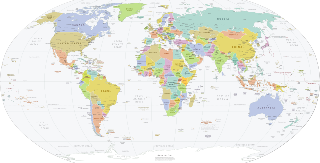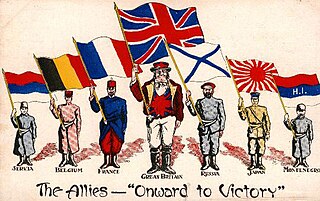Europe of Sovereign Nations (ESN) may refer to:
- Europe of Sovereign Nations (party), an ultranationalist European political alliance
- Europe of Sovereign Nations Group, an ultranationalist political group of the European Parliament
Europe of Sovereign Nations (ESN) may refer to:

A country is a distinct part of the world, such as a state, nation, or other political entity. When referring to a specific polity, the term "country" may refer to a sovereign state, states with limited recognition, constituent country, or a dependent territory. Most sovereign states, but not all countries, are members of the United Nations. There is no universal agreement on the number of "countries" in the world since several states have disputed sovereignty status, limited recognition and a number of non-sovereign entities are commonly called countries.

Sovereignty can generally be defined as supreme authority. Sovereignty entails hierarchy within a state as well as external autonomy for states. In any state, sovereignty is assigned to the person, body or institution that has the ultimate authority over other people and to change existing laws. In political theory, sovereignty is a substantive term designating supreme legitimate authority over some polity. In international law, sovereignty is the exercise of power by a state. De jure sovereignty refers to the legal right to do so; de facto sovereignty refers to the factual ability to do so. This can become an issue of special concern upon the failure of the usual expectation that de jure and de facto sovereignty exist at the place and time of concern, and reside within the same organization.

International relations (IR), are the interactions among sovereign states. The scientific study of those interactions is also referred to as international studies, international politics, or international affairs. In a broader sense, the study of IR, in addition to multilateral relations, concerns all activities among states—such as war, diplomacy, trade, and foreign policy—as well as relations with and among other international actors, such as intergovernmental organizations (IGOs), international nongovernmental organizations (INGOs), international legal bodies, and multinational corporations (MNCs).
Ultranationalism or extreme nationalism is an extreme form of nationalism in which a country asserts or maintains detrimental hegemony, supremacy, or other forms of control over other nations to pursue its specific interests. Ultranationalist entities have been associated with the engagement of political violence even during peacetime. The belief system has also been cited as the inspiration for acts of organized mass murder in the context of international conflicts, with the Cambodian genocide being cited as an example.
Confederacy or confederate may refer to:
State most commonly refers to:
ESN may refer to:
Sovereigntism, sovereignism or souverainism is the notion of having control over one's conditions of existence, whether at the level of the self, social group, region, nation or globe. Typically used for describing the acquiring or preserving political independence of a nation or a region, a sovereigntist aims to "take back control" from perceived powerful forces, either against internal subversive minority groups, or from external global governance institutions, federalism and supranational unions. It generally leans instead toward isolationism, and can be associated with certain independence movements, but has also been used to justify violating the independence of other nations.

National identity is a person's identity or sense of belonging to one or more states or one or more nations. It is the sense of "a nation as a cohesive whole, as represented by distinctive traditions, culture, and language".

Tōhōkai was a Japanese fascist political party. The party was active in Japan during the 1930s and early 1940s. Its origins lay in the right-wing political organization Kokumin Domei which was formed by Adachi Kenzō in 1933. In 1936, Nakano Seigō disagreed with Adachi on of matters of policy and formed a separate group, which he called the 'Tōhōkai'.

Slovenian nationalism is the nationalism that asserts that Slovenes are a nation and promotes the cultural unity of Slovenes. Slovenian nationalism first arose in response to the influx of ideas of nationalism from the French Revolution that arrived in Slovenia when the French forces of Napoleon Bonaparte made Slovenia part of the Illyrian Provinces from 1809 to 1813. Slovenian nationalists such as Anton Korošec endorsed Yugoslav unification during World War I as a means to free Slovenia from Austro-Hungarian rule.
A sovereign state is a state that has the highest authority over a territory.

The Social-National Party of Ukraine was a far-right party in Ukraine that would later become Svoboda. The name of the party was an intentional reference to the Nazi Party in Germany. The party combined radical nationalism, neo-fascist and anti-communist positions.

Revival is a far-right and ultranationalist political party in Bulgaria, founded in August 2014. Its chairman is Kostadin Kostadinov. The party is characterised by various analysts and media as pro-Russian, anti-EU, anti-NATO, anti-American, being opposed to COVID-19 vaccinations and spreading anti-vaccine and anti-LGBT rhetoric.
The Greek Solution a political party in Greece founded by former MP Kyriakos Velopoulos. The party is right-wing to far-right and has been described as ideologically ultranationalist, national conservative, and right-wing populist. The party garnered 3.7% of the vote in the 2019 Greek legislative election, winning 10 out of the 300 seats in the Hellenic Parliament and 4.18% of the vote in the 2019 European Parliament election in Greece, winning one seat in the European Parliament.